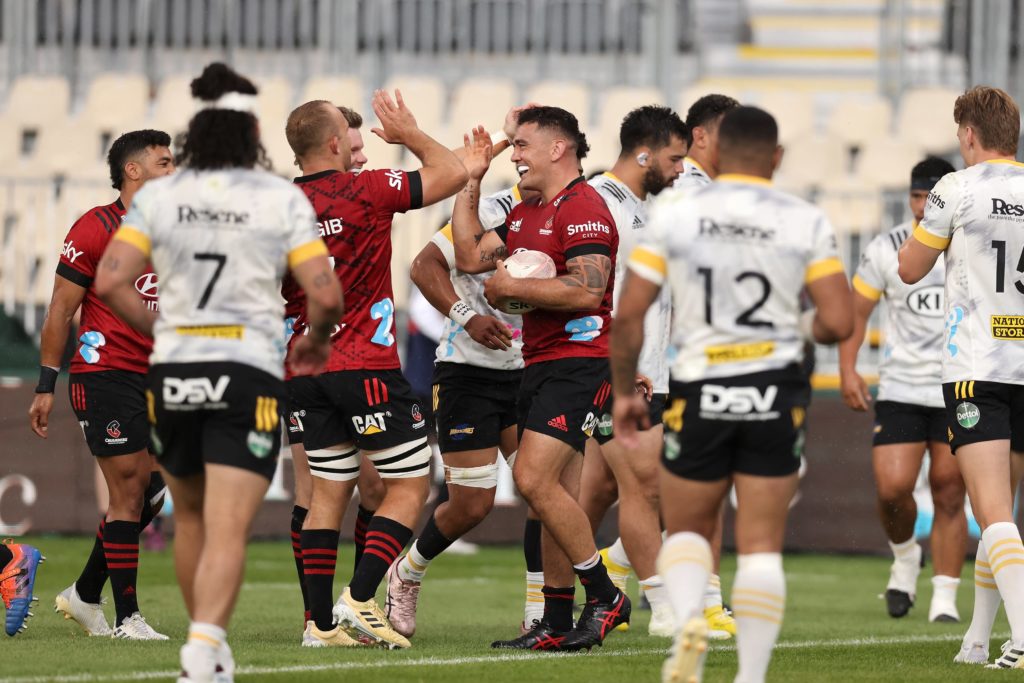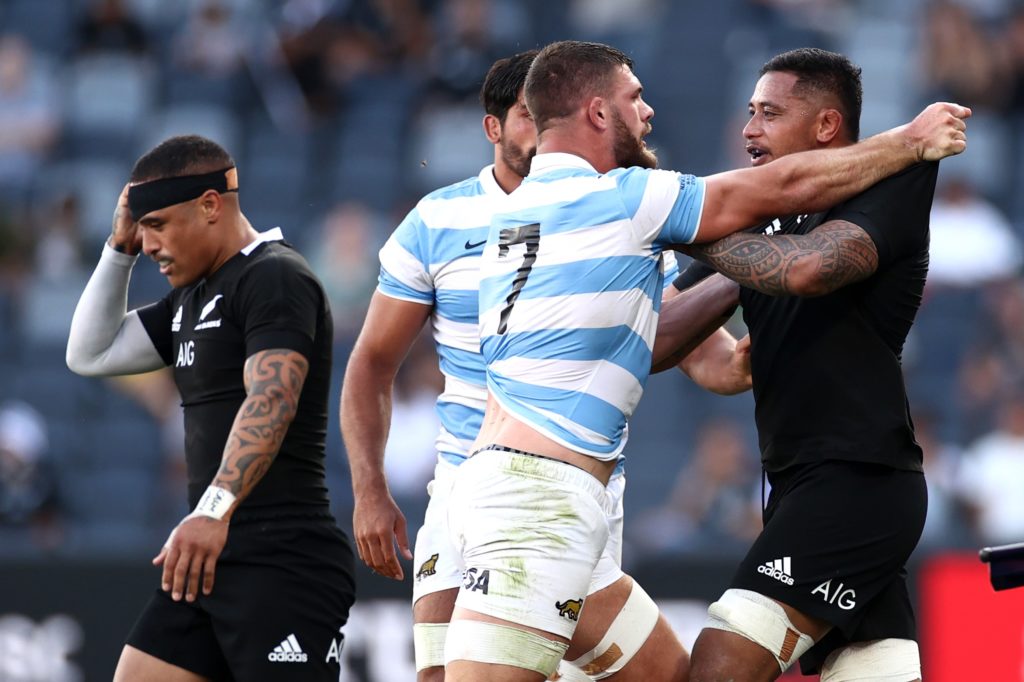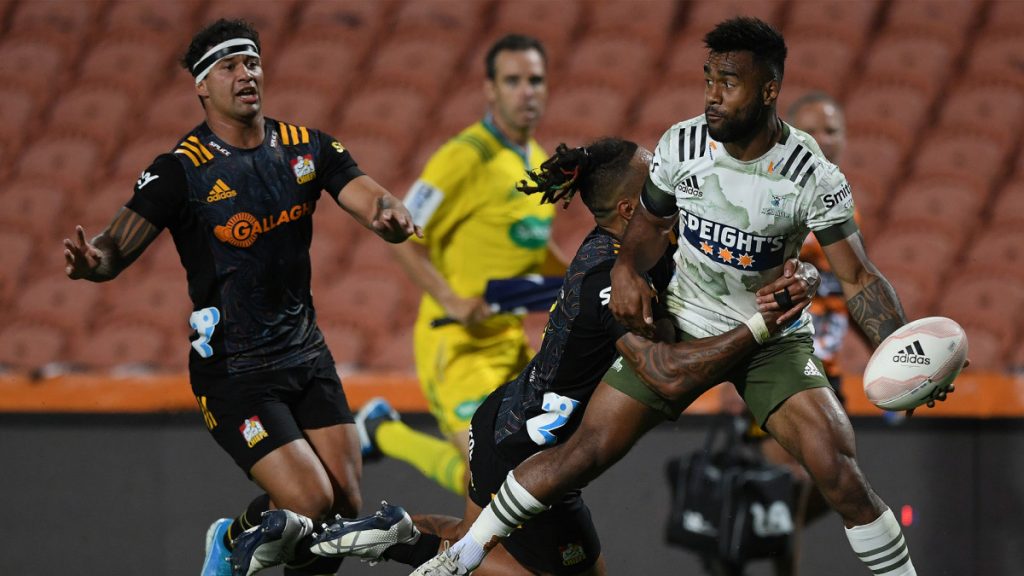Can too much of what is generally considered to be a good thing turn out to be a bad thing?
As the Crusaders ran rampant against the Hurricanes in a three-try, 10-minute burst at the weekend after the Highlanders bounced back from a nine-point halftime deficit to dismantle the Chiefs in Hamilton, the second round of Super Rugby Aotearoa probably raised more questions than answers about the competition.
Uppermost in terms of conclusions reached will be that the defending champion Crusaders will be in the final – scheduled for May 8 but likely to be delayed if and when the trans-Tasman competition is cancelled due to Covid – but it has to be said there is uncertainty too about the overall strength of the five Kiwi teams.
We’re heading into round three now and all of them have played at least one game. The skill and pace that we associate with the competition is there in abundance, but already the intensity appears lower than last year, a drop off which can’t necessarily be explained by the departure of key players as Hurricanes halfback TJ Perenara and Blues first five/fullback Beauden Barrett are the only high-profile absentees from last season.
There are collisions and offloads aplenty. It’s entertaining stuff as usual. The pace is high. But the only team that has shown they are prepared to dig deep within themselves to do whatever it takes to win are the Crusaders and that has been displayed in the defence of their line which is bordering on obsessive in its commitment and attention to detail.

Any apparent drop-off in overall intensity by itself won’t trouble Crusaders’ head coach Scott Robertson, aiming to win five Super titles in a row, or Chiefs head coach Clayton McMillan, who will care only about how to break a losing streak for the side which has reached double figures. He’s been in charge for only one of those; a crushing defeat to the Highlanders at Waikato Stadium after his men appeared fully in charge of the match, but it’s likely to reach 11 on Saturday as the Crusaders prepare to play host.
There are collisions and offloads aplenty. It’s entertaining stuff as usual. The pace is high. But the only team that has shown they are prepared to dig deep within themselves to do whatever it takes to win are the Crusaders.
The Blues will be worried only about continuing their round one form against the Hurricanes after a bye week which saw them camp out in Cambridge due to a Covid lockdown in Auckland. The Hurricanes are 0-2 which means their coach Jason Holland has plenty to occupy himself with, while the Highlanders under Tony Brown are likely to be feeling fairly chipper after their remarkable 39-23 victory over the Chiefs. They appear likely to be the surprise package of the Kiwi teams – as in, you’ll never really know what you’re going to get from them.
But a bigger picture view may highlight a few concerns about how this competition will prepare New Zealand’s players for the test season to follow, whatever that will look like, and possibly even a World Cup which is only two and a half years away.
That’s because the All Blacks were disappointing last year in the Rugby Championship following their Super Rugby Aotearoa preparation. Yes, they had a new head coach in Ian Foster and an extended stay in Australia to contend with, but they were put off their stride by Australia’s physicality in the drawn test in Wellington before that and appeared shocked by Argentina’s aggressive and fully committed performance in Parramatta. The Wallabies’ victory in Brisbane owed much to a similar approach.
The All Blacks were short of ideas on attack in their first ever defeat to the Pumas, and they failed to impose themselves on the blue and white pack. The Crusaders, who inevitably score after retaining possession for long enough, and who can control matches by their set piece alone, had five players in that match-day squad, including playmaker Richie Mo’unga and key forward Sam Whitelock. Physically they were all off, but tactically they had no answer either. The onslaught appeared to come as a shock.

And this despite the received wisdom that Foster’s men were battle hardened by Super Rugby Aotearoa and the Bledisloe Cup series. The Pumas meanwhile were forced to prepare while in quarantine at their hotel.
Something else to consider is that the All Blacks were up against a loose forward in Marcos Kremer who is unlike anyone playing in Super Rugby Aotearoa. Kiwi loose forwards have become used to running with the ball in space. They link attacks, make tackles, clean out rucks. But few, apart from perhaps the Hurricanes’ Ardie Savea, do it with an unrelenting consistency and commitment, a hallmark of the now retired Richie McCaw’s game at any level. Sam Cane was good last year but he can only do so much.
In that famous test victory in Parramatta last year, the indefatigable Kremer made 28 tackles, 14 of which were dominant. That’s a high percentage in an abnormally high number of tackles in a test. He also made 14 carries as he wrote himself into Argentine rugby folklore. Skipper Pablo Matera, another monstrous loose forward, was similarly dominant. Even now it’s difficult to understand how the pair and their teammates could play at such intensity.
For former All Blacks hooker James Parsons, Kremer’s heart-and-soul performance was indicative of the Pumas as a whole.
“I felt like that Argentina No 7 jersey was just everywhere and, defensively, he was. He was into everything,” Parsons said afterwards on the Aotearoa Rugby Pod podcast.
In a conversation with Justin Marshall last year, the former All Blacks halfback maintained New Zealand, South Africa and Australia would be considerably better overall if they remained in Super Rugby.
“I think South Africa have got better playing New Zealand more and I think that’s the same as Australia, who play a similar style to us, albeit one which is probably less physical,” Marshall said. “But the Wallabies have a different balance in their game and we need to be challenged like that. They’re innovative.”
By contrast, the Super Rugby Aotearoa coaches and players pretty much know what they’re going to get from their Kiwi rivals. The players know the strengths and weaknesses of their opponents intimately and we’ve yet to see significant innovation even from Highlanders’ head coach Tony Brown, a man now almost synonymous for it.

Does that explain a certain flatness in many of the six Super Rugby Aotearoa games played so far? Or is it something else – something related to starting a new season with little idea about how it will finish or what the All Blacks are doing afterwards?
New Zealand’s top players have no idea what their year looks like beyond May. If the trans-Tasman competition is ruled out, the Kiwi teams will play each other again once before the top two enter the final, but there is little clarity about what will happen and most elite rugby players don’t operate well in a fog of uncertainty.
“I think South Africa have got better playing New Zealand more and I think that’s the same as Australia, who play a similar style to us, albeit one which is probably less physical. But the Wallabies have a different balance in their game and we need to be challenged like that. They’re innovative.”
Former All Black Justin Marshall
The Covid vaccine will presumably change the landscape again and New Zealand’s top players could be near the front of the queue given their profession depends on it, an exalted position likely to raise eyebrows from other sections of society, and it could be that the vaccine makes touring the United Kingdom at the end of the year a viable option.
Above all, the priority will be to welcome back Australia’s involvement in Super Rugby in some form for the variety and change in approach. South Africa’s absence and accompanying early-morning kick-offs and one-sided results won’t be mourned by many in this part of the world, but there’s little doubt they brought a different mentality too, one that stimulated Kiwi coaches and players alike to find solutions. In the coming years it may come to be accepted in New Zealand that the South Africans were worthy contributors to Super Rugby.
In the meantime, it’s up to the Highlanders, Hurricanes and Chiefs in particular to raise their games, and raise them they must for Super Rugby Aotearoa to live up to the hype.


Comments
Join free and tell us what you really think!
Sign up for free